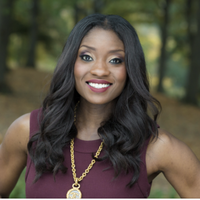Generation Yara
\201cWe’re in a time in which we’re no longer settling for reform, but genuine reimagination.\201d
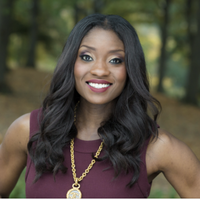
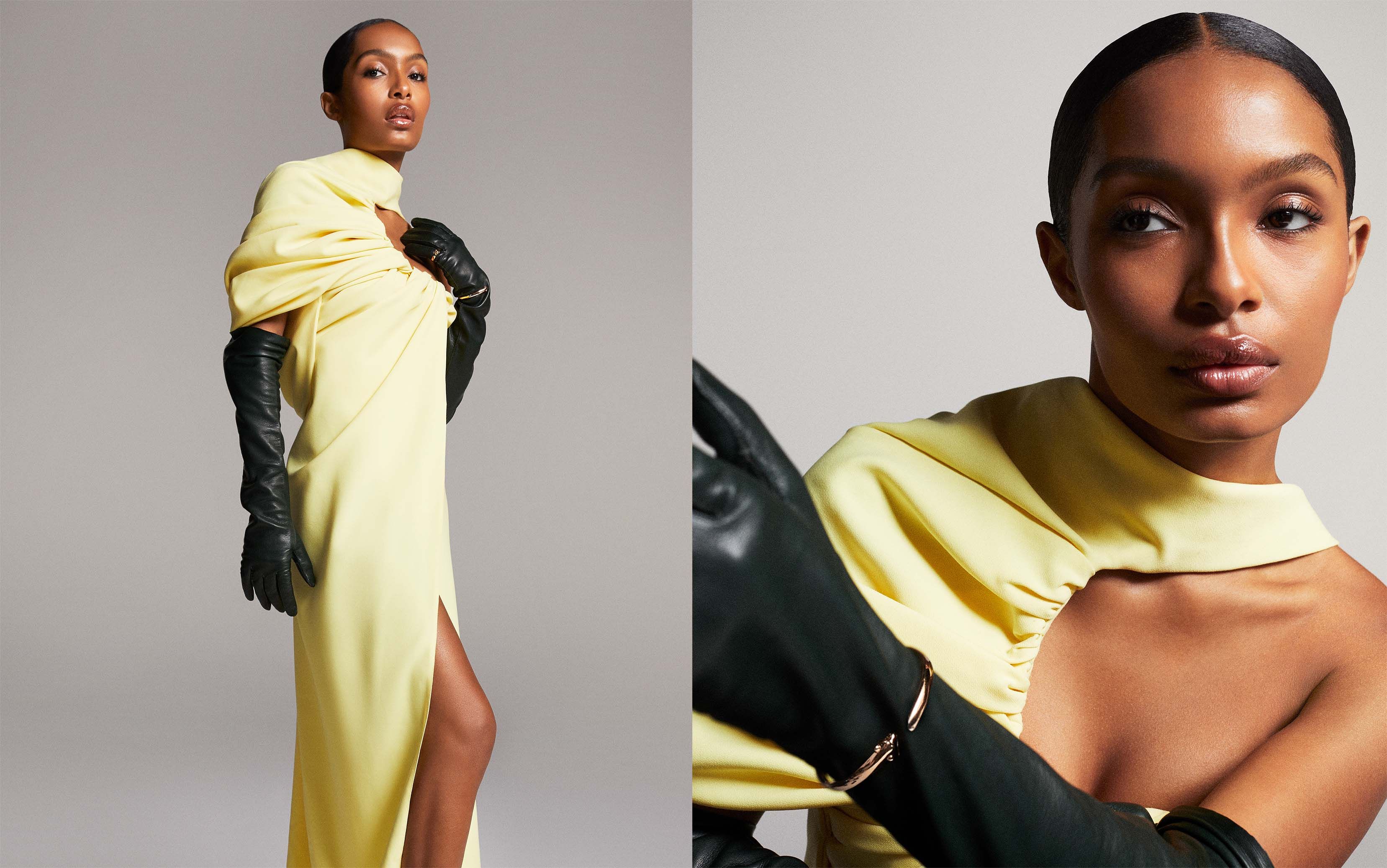
Ellery dress; Seymoure gloves; Cartier bracelet and ring.
It’s only been three years since Yara Shahidi, 21, officially began “adulting,” but the preternaturally poised actress is already tiring of being responsible for her own life day in and day out. “The worst part is that it’s constant,” Shahidi says jokingly. “This should be a once-a-week activity, friends.” The college senior is tucked away in a minimalist apartment on the East Coast, sounding every bit the grownup as she discusses her final year at Harvard University; 7th Sun Productions, a production outfit she recently launched with her mother; and life after Black-ish, the hit ABC sitcom that made her one of the most sought after young actresses in Hollywood. She does all of this while simultaneously battling a pollen-induced allergy attack that prompts a sneezing fit, several pauses for water, and a lozenge run. It would be a lot for anyone—of any age—but Shahidi remains unflappable and somehow manages to still look luminous despite the all-out attack on her orifices.
“The world,”—cough—"is out to get me,” she deadpans, before taking a deep breath and explaining what motivated her to launch her own company last year. Shahidi was not only eager to see more diverse representation in front of and behind the camera, but she wanted to introduce fresh voices into the Hollywood mix. “Oftentimes with studio systems you get the same list of folks who’ve always had the same opportunities,” she explains. “Breaking [new] people into the studio system, that’s been something that’s been really important to us.”
“Us” is Shahidi and her mother, Keri, co-founder of 7th Sun. The inseparable mother-daughter duo (they Facetime at least 10 times a day) already have a slate of projects on the horizon, including several animated series, an unscripted show dedicated to upliftment, and Smoakland, a comedy about a Black female cannabis shop owner in Oakland, California. “Our goal is to really collapse the hierarchy and how power is traditionally disseminated in spaces like this and give people autonomy to have a voice,” says Keri. “That balance of compassion and focus has really moved us forward and it keeps us inspired.”
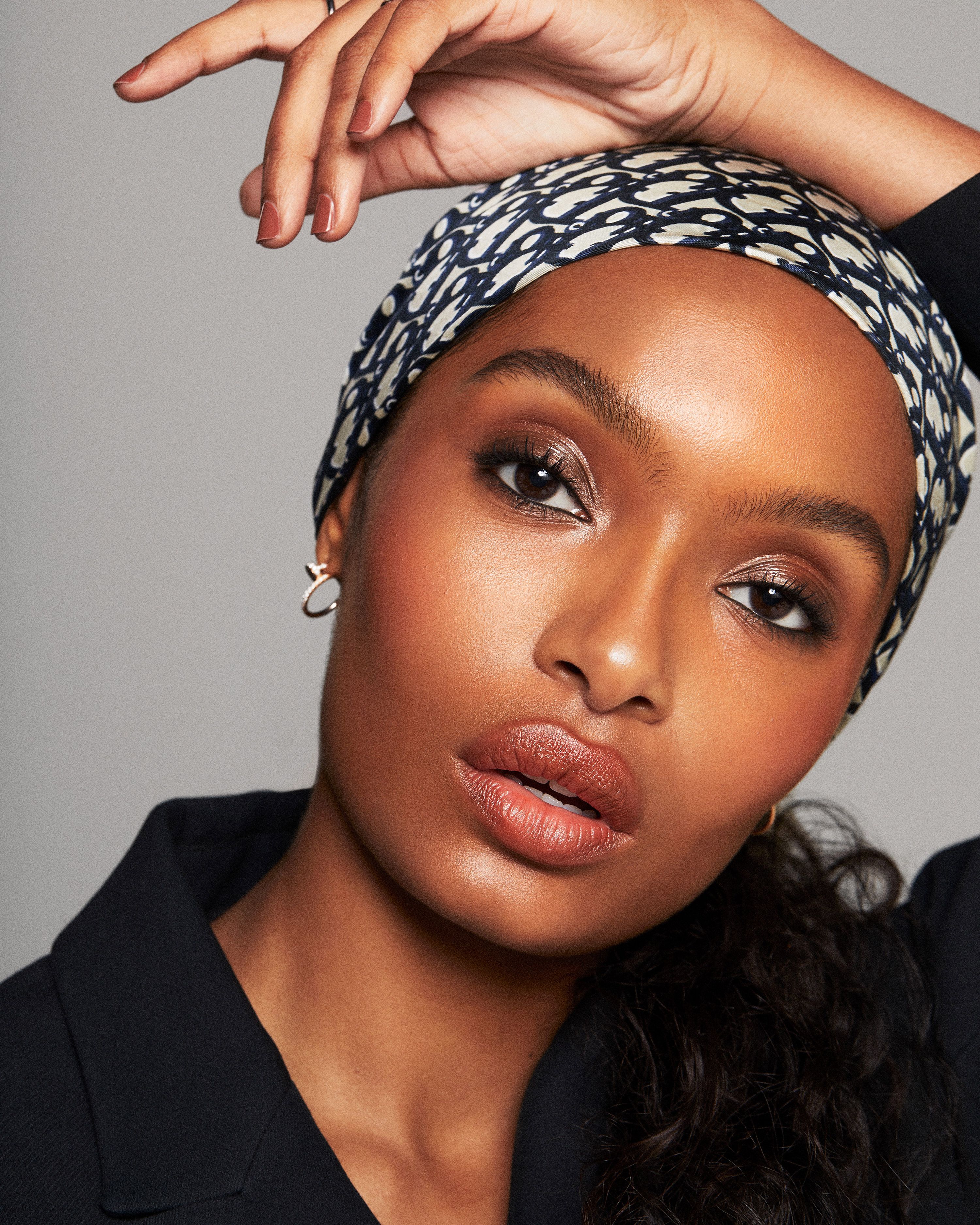
Dior jacket and scarf; Cartier earrings and ring.
While Shahidi’s character on the coming-of-age comedy Grown-ish, Zoey Johnson, still remains on a madcap quest to find herself, Keri says Yara has been driven since the womb. “I think she was just born an old human,” she shares. “In one space we’re peers, in another space, if you looked at it traditionally, I’m supposed to be the teacher, but teachers come in many shapes and sizes and she’s one of my teachers.” I ask Mama Shahidi about her daughter’s leadership style. “She’s a gentle giant,” Keri proudly states. “She’s really compassionate and I think what balances her compassion is her focus, so nothing is fluff.”
Shahidi’s mission to ensure a more equitable distribution of power, resources and opportunities in her industry—and throughout the world, ultimately—is reflected in the projects she chooses, the products she endorses, the people she hires, and the brands with which she aligns. And over the years there have been no shortage of companies eager to attach themselves to the woke wunderkind. Cartier is one brand happy to call Shahidi a Friend of the Maison. “She truly embodies the Cartier spirit with her infectious energy, creativity, curiosity and through her inspiring work as an actor, producer and most importantly, as a change agent,” Mercedes Abramo, President & CEO, Cartier North America, told Marie Claire in a statement. Chanel, Adidas, Tory Burch, and Bobbi Brown have also aligned with the actress, and most recently, Dior named Shahidi Global Brand Ambassador for Women’s Fashion and Makeup.
“I never rep products that I don’t actually really like,” Shahidi explains. “I spent all of Grown-ish using [Dior] products and every time you see my face out in the world, even if they’re not tagged, it is a Dior makeup product. And it is the first time in my career in which I can put on a foundation and not end up with a breakout by the end of the day. And we’re working 15-hour days.” Shahidi and her team have brands sign what she calls a “reverse morality clause” as one condition of doing business with her. “You as a company also have to fit within my certain values and if there are moments in which you step outside of that because of something a representative says, then there will be consequences,” she warns.
Shahidi landed her first print ad at six weeks old, started her first corporation, Dharma Driven, at age 8, made her film debut starring opposite Eddie Murphy in Imagine That when she turned 9, and landed Black-ish at 14. She’s won NAACP and Gracie Awards, orchestrated a successful youth voter registration campaign, and made the Forbes 30 Under 30 Hollywood list. Even Oprah has said Shahidi should run for president. First Lady Michelle Obama—who famously wrote one of Shahidi’s Harvard recommendation letters—will be thrilled to know that, despite the demands of starring in and executive producing Grown-ish, double majoring in social studies and African American studies, and advocating for industry-wide inclusivity, she’s also been an ace student. “Straight A semesters,” Shahidi says, humbly flexing. “I’m just a nerd through and through. I remember the first time I had gotten a C on a paper in high school, I literally cried and I was like, ‘This is going to affect my life forever.’” She laughs at the memory. “I’m just built to deeply care about grades.”
Get exclusive access to fashion and beauty trends, hot-off-the-press celebrity news, and more.
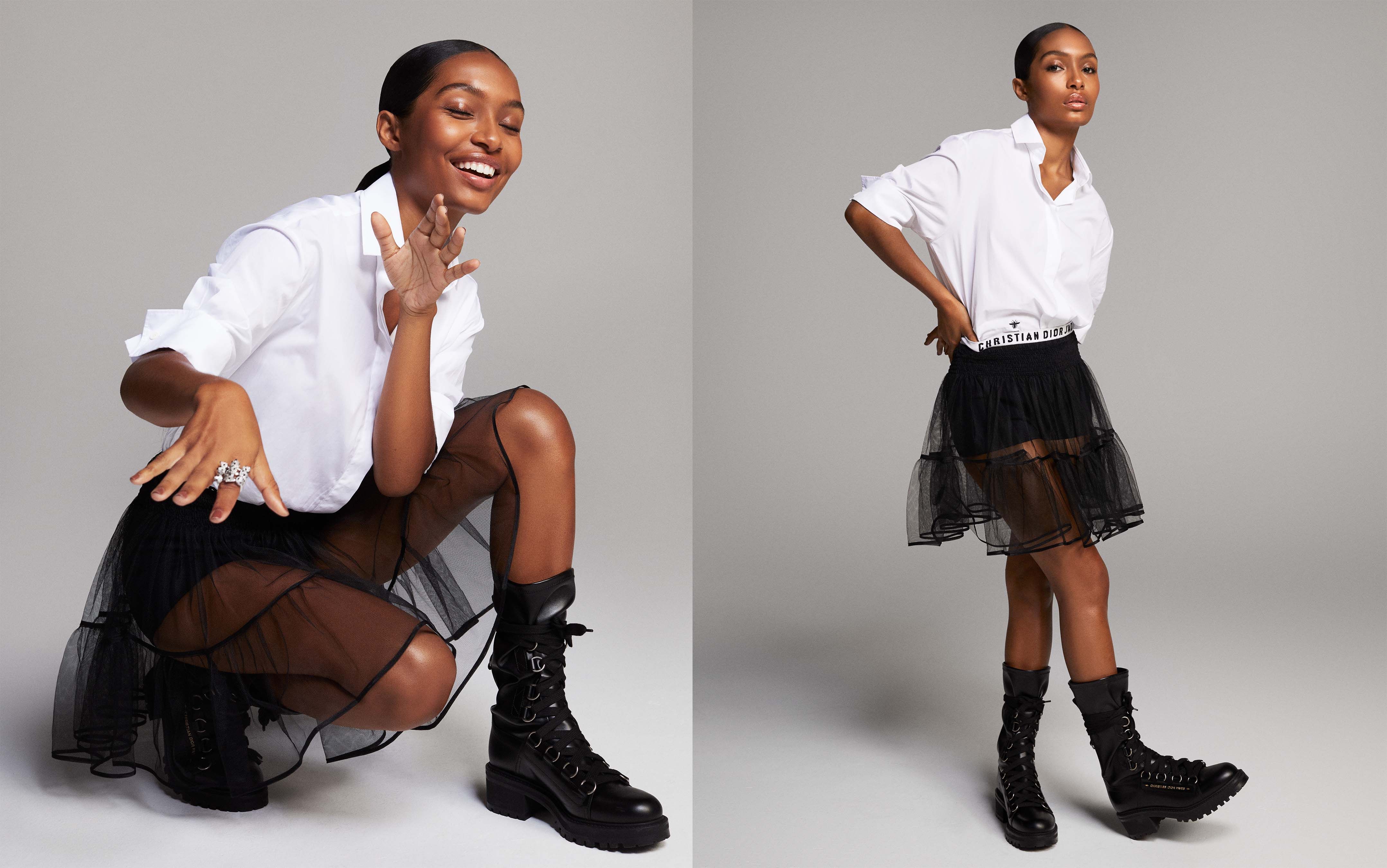
Dior top, skirt, briefs, boots; Cartier ring.
Her success is all that more impressive given that the road from child star to grown celebrity can be a treacherous one filled with scandal, rehab stints, and tragic tales of squandered talent. It helps that she and her two brothers were raised in a family filled with academics and high-achievers. Her mother is a successful commercial actress. Her father, Afshin, an Iranian émigré, is a cinematographer (and Prince’s former photographer). Her cousin is the rapper Nas. There’s even an astronaut in the mix.
Getting off of Twitter has done wonders for me. It’s allowed me the peace of mind to think through what matters to me and why.
What becomes clear within seconds of speaking with Shahidi is that she’s genuinely brilliant, delightfully wry, and seldom at a loss for words. In fact, she has the perfect answer to any question at the ready—that is until I begin to inquire about her love life. When I point out that she has never been publicly linked to anyone romantically, she offers up a sly grin and states, “And I’m not going to be.” After a few more failed attempts to get her to dish about any past or present significant others, our conversation hopscotches across history and contemporary pop culture: Richard Nixon’s war on Black youth. Cancel Culture (“Oftentimes Internet culture isn’t necessarily about accountability, which I think is essential, but just about disappearing somebody…”). The pleasures of binge-watching Law & Order SVU (“Stabler’s back!”). And her unabated Frank Ocean obsession (“I think I said two words when we first met,” she confesses. “Everything’s a little more casual now, but I definitely was awkward.”)
If you could have a contemporary artist create a soundtrack for your life, who would it be,” I ask Shahidi, a die-hard music lover and avid record collector.
“Top of mind, I’d have to say André 3000 because I feel like he’d just do a dope job,” she says. “His general versatility constantly astounds me.”
What would it sound like?
“I’d give him artistic license. I’d be like, ‘do you friend. Whatever you do I’ll be happy with.”
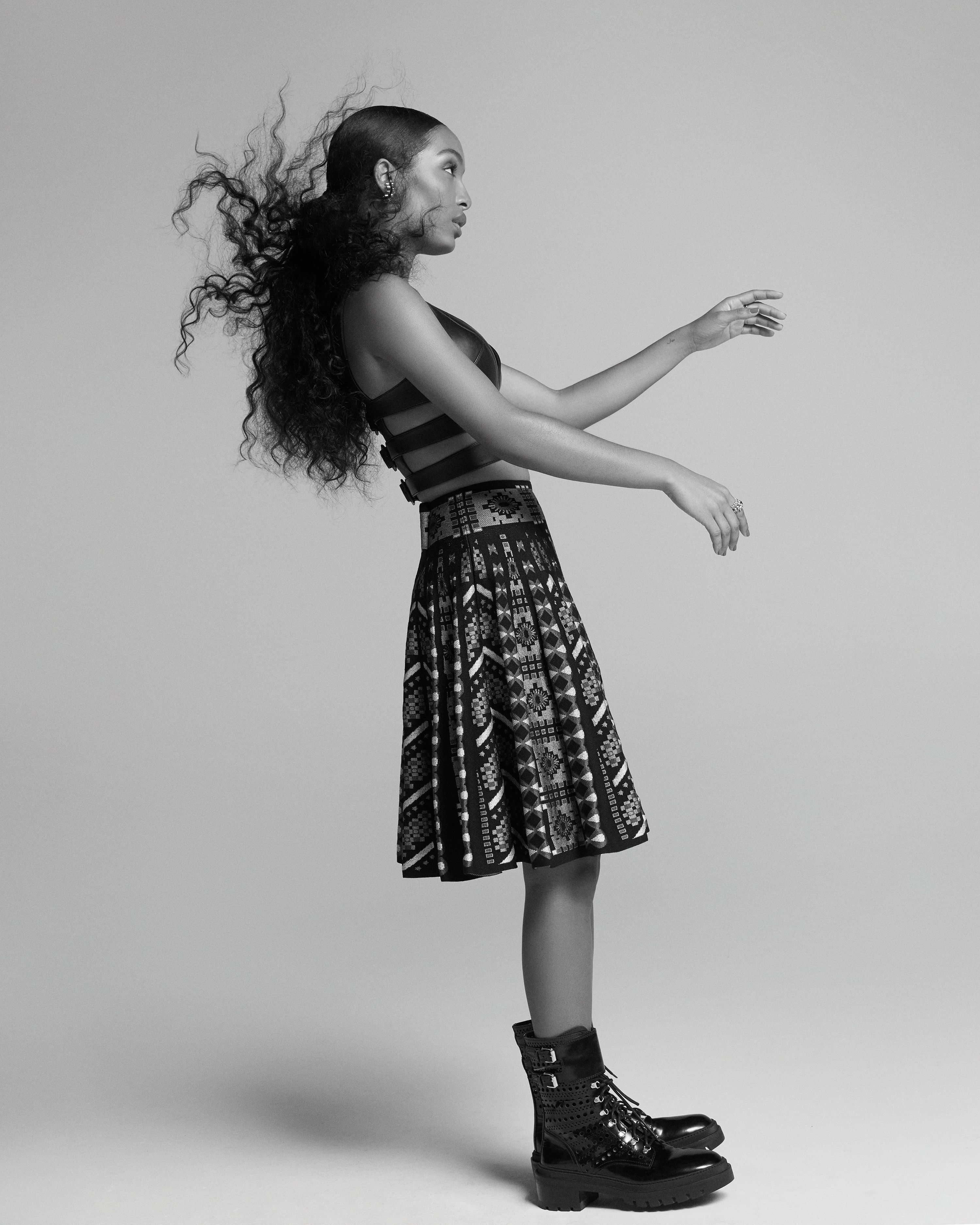
Alaia top, skirt, boots; Cartier earrings and rings.
Earlier in the day, Twitter had been ablaze with rumors that Kanye West and Drake were possibly dropping new albums. Shahidi wouldn’t know. She quit Twitter in late 2020 and says leaving the social media app was a game changer. “I feel like I used to have two voices in my brain,” she reveals. “When I looked at projects, I’d have my voice and then I’d have what I labeled the ‘Twitter voice.’” The “Twitter voice” was insidious and would sometimes cause her to second guess her choices, she explains. “I have gone to school to further my studies and understanding so that when you hear me speak, it isn’t some shallow ‘hey, I just read about this yesterday. Let me regurgitate what I read.’ I’ve done my best to even challenge my own beliefs, to become more steadfast in what I believe. What was disarming about this ‘Twitter voice’ was that all of that went away and didn’t matter to me as soon as I heard it…. Getting off of Twitter has done wonders for me,” she continues. “It’s allowed me the peace of mind to think through what matters to me and why.”
Peace of mind. It’s been the subject of vigorous debate in recent months, spurred in part by the decisions of several Black female athletes to put their emotional well-being before sports. Naomi Osaka kicked off the conversation earlier this year when she withdrew from the French Open to focus on her mental health. Simone Biles sat out most of the Tokyo Summer Olympics for similar reasons. And Simone Manuel, a Black Olympic gold medalist in swimming, has been open about battling depression brought on by the stress of overtraining. While some critics derided Biles, Osaka, and Manuel, questioning their strength and inherent talent (or worse), others applauded them for their bravery. Shahidi is firmly in the latter camp.
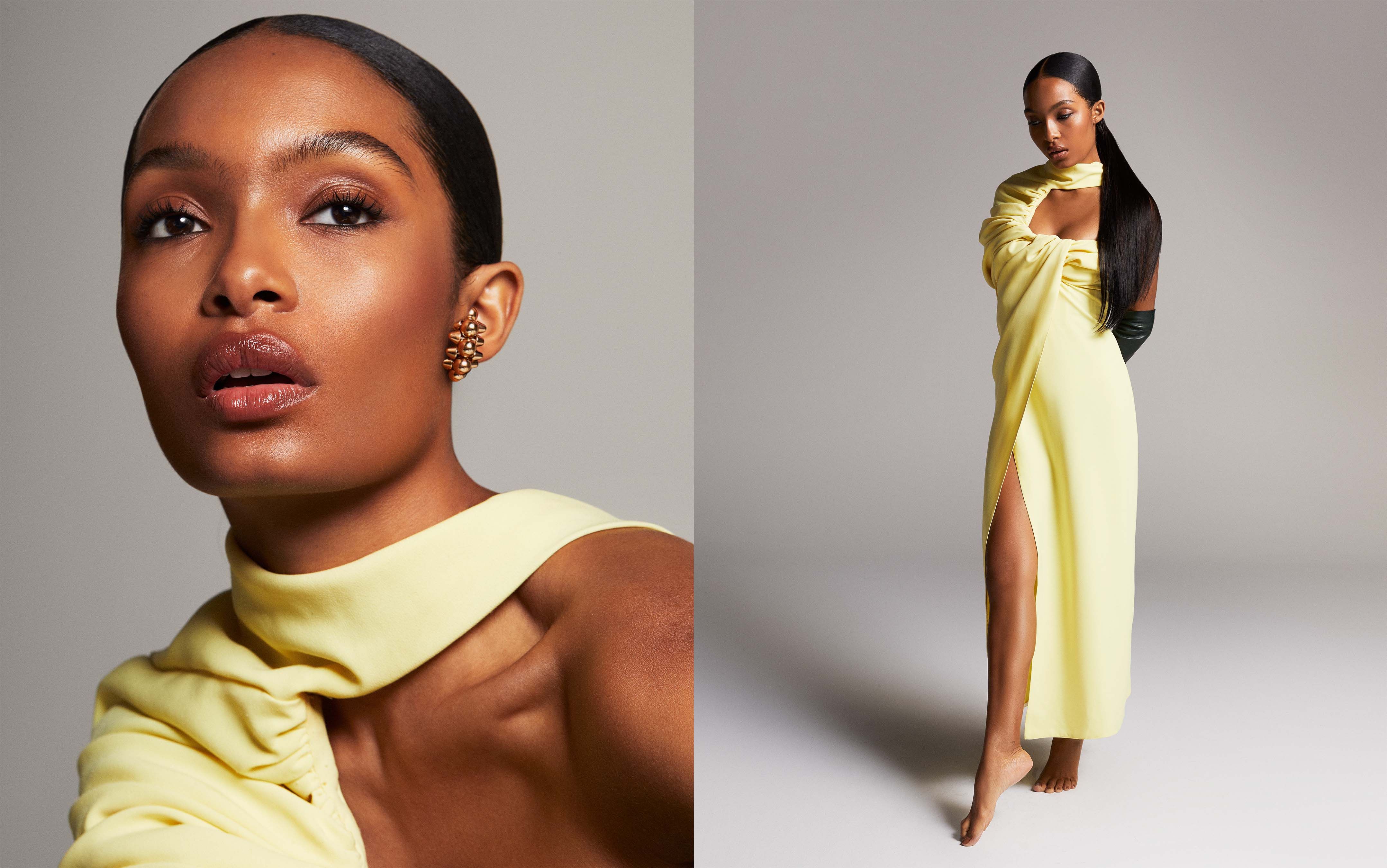
Ellery dress; Seymoure gloves; Cartier earring.
“I’m so grateful for their decisions, not only to put their mental health first, but to share that journey with us and be public about it. That’s not something that they owed any of us. They took something that happens behind the scenes for so many of us and put it front and center.” And she adds, “what’s been lovely to witness is that as much as there has been pushback, there has also been an outpouring of support, of people saying, ‘I see you and I love the fact that you’re making us look at you as a whole human, regardless of what people are saying.’”
These are fraught times, but Shahidi remains hopeful, steadfastly refusing to give into despair. That, in turn, spreads optimism to others. Sherrilyn Ifill, president and director-counsel of the NAACP Legal Defense and Educational Fund, who has spent decades in the fight for civil rights and racial justice, says that Shahidi gives her hope for the future. “She is such a powerful example of how young people are refusing to allow themselves to be siloed or silenced. She is a talented actress, a brilliant student, an activist, and a great American beauty, who is deeply and unapologetically engaged with issues of racial justice and equality,” says Ifill, adding that she is in awe of the Gen Z icon. “[I’m] so proud of how she is walking as a young Black woman at this critical moment in our country.” Shahidi is quick to point out, however, that she’s not an anomaly. Greta Thunberg, Malala Yousafzai, Naomi Wadler, poet Amanda Gorman are but a handful of activists in Shahidi’s age group who are—to paraphrase Gorman—brave enough to both see and be the light.
We’re in a time in which we’re no longer settling for reform, but genuine reimagination.
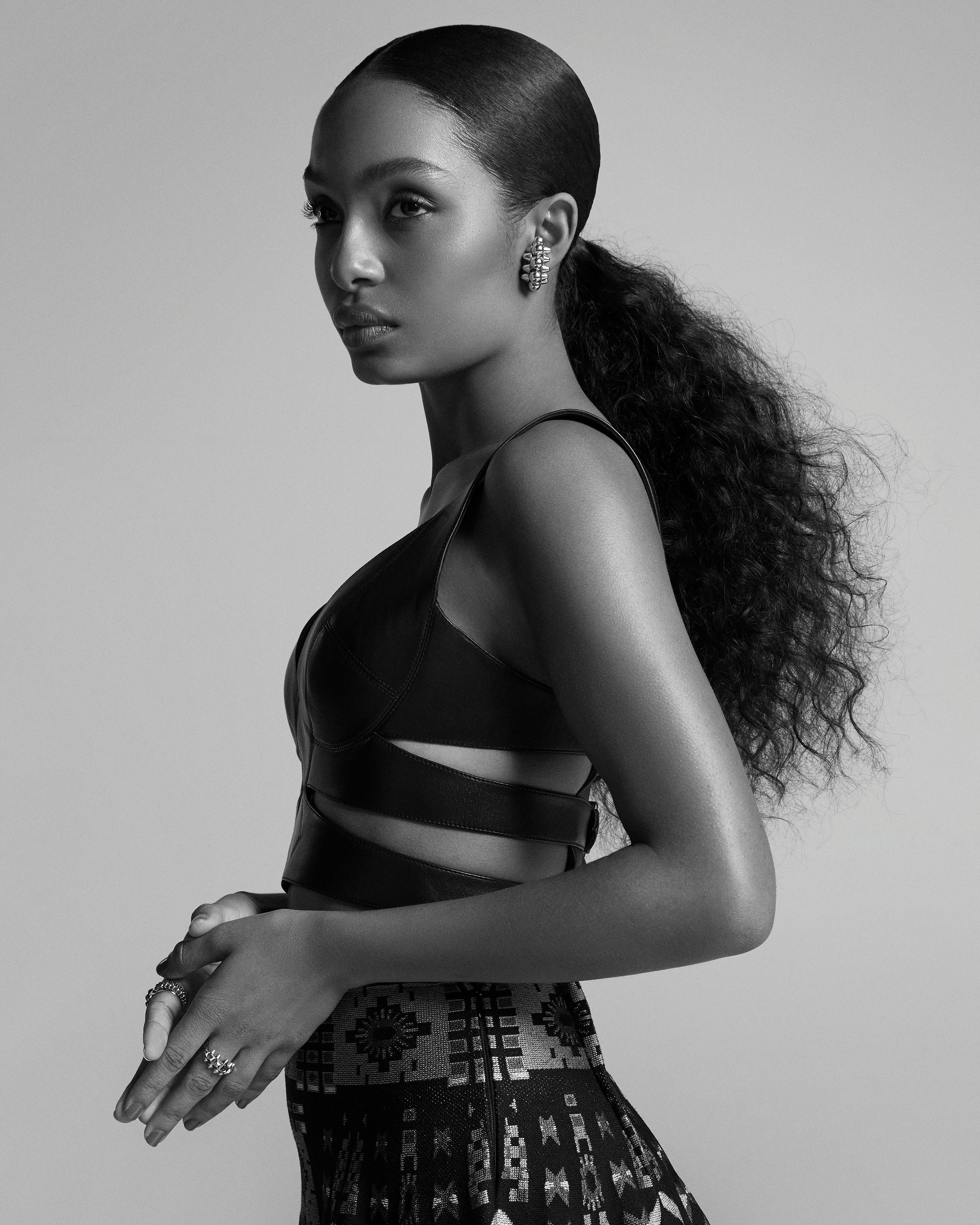
Alaia top, skirt; Cartier earrings and rings.
“Even in these really sad moments, the way my peers astound me regularly with what they continue to figure out to do to be of service to the world, things that I could not have even imagined,” Shahidi marvels. “It makes me excited for where we can go. We’re in a time in which we’re no longer settling for reform, but genuine reimagination.” She points to the shift in dialogue about the “system being broken” to “the system was working precisely as it was meant to [and that’s a problem]” as a prime example of just how much has changed in her lifetime. “Watching this kind of change in rhetoric leaves a lot of really cool possibilities in front of us,” she says. “That’s not to say that getting there will be easy, but it will change how we orient ourselves to everyday action and that’s so exciting.” In order to achieve a more perfect union, Shahidi argues that the West needs to honestly reckon with its role in the global catastrophes we’re currently witnessing. “We’re starting to talk more publicly about the effects of colonialism, slavery, etc, not just as something that happened in the past, but as something that has had ongoing and continued effects. These conversations have happened in academia, have happened in grassroots circles for years and years, they just weren’t necessarily happening in these mainstream platforms.”
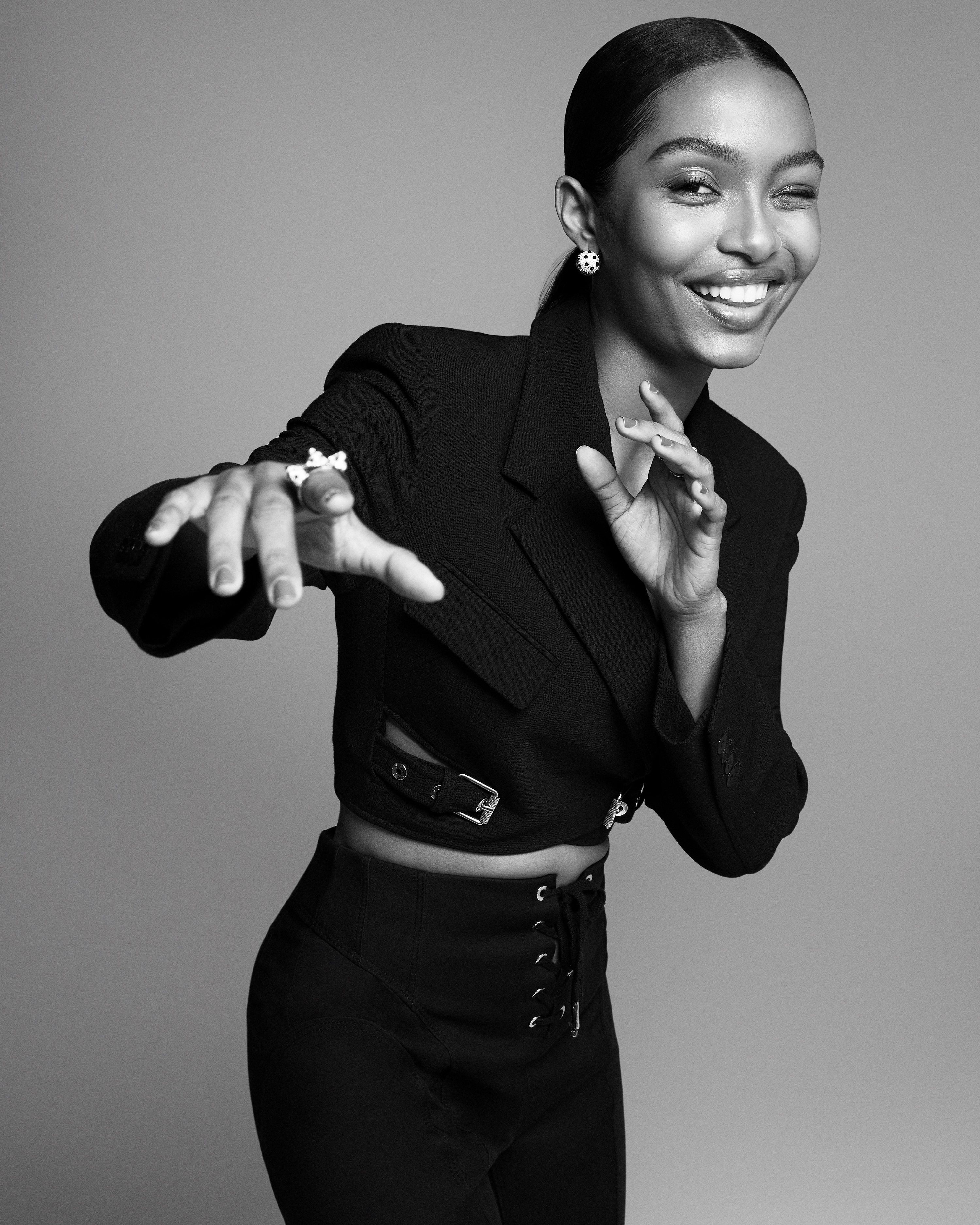
Dion Lee top and pants; Cartier earrings and ring.
Black-ish helped mainstream many such conversations. Fans immediately embraced the show’s tight-knit, upwardly mobile Johnson family and heralded the hit series for wrestling with the thorniest issues of the day (voter suppression, intersectional feminism, police brutality, housing insecurity). The eighth and final season of the Emmy-nominated series will air in early 2022. Saying goodbye will be “absolutely bittersweet,” Shahidi admits, but she remains immensely proud of all that the award-winning sitcom achieved. “If you were to track how many people were able to get their show’s greenlighted who came from Black-ish, if you were to think about the incredible opportunities and doors that it’s opened behind the scenes, that has really been what is most special,” she explains. “You think about just how many directors and writers that have come through and then gone off to do epic things and tell their own super-specific stories. That impact! I don’t know if we’re ever going to be able to capture the full extent.”
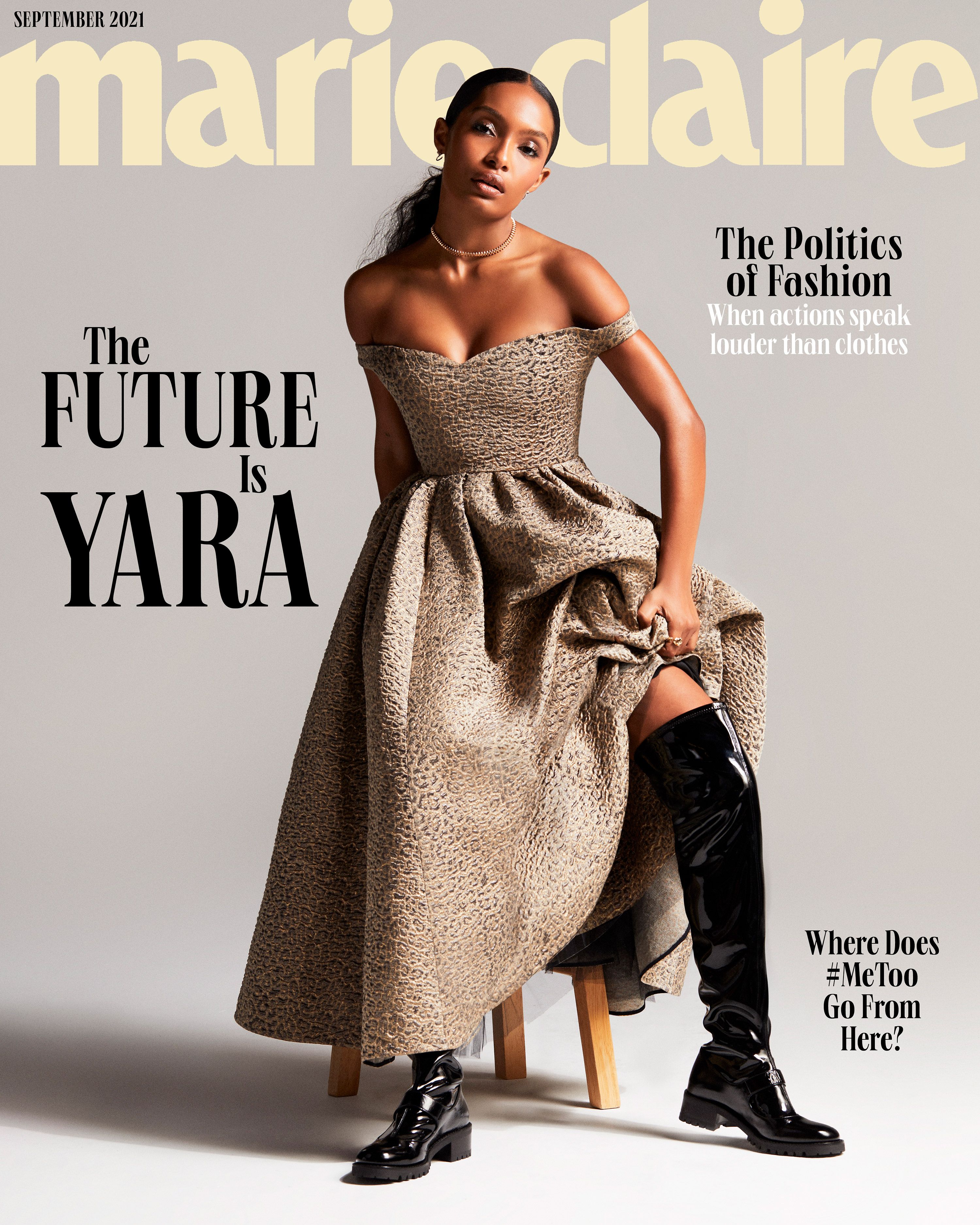
Dior dress and boots; Cartier necklace and earrings.
Up next, Shahidi will play Tinker Bell in Disney’s new live-action Peter Pan film, due Spring 2022. And in her hands, one of literature’s most famous sidekicks will have a lot more agency, she promises. “She’s genuinely portrayed as Peter Pan’s partner, which is fun,” she says. “She’s still that flawed, pesky character who can get into a bit of trouble sometimes, not necessarily the best influence, but I love her story arc.”
Shahidi has a number of options she’s considering for her next chapter. Starting a think tank, opening a music studio, more studies—at Oxford “you can get a degree in nine months,” she says excitedly—maybe even law school. For now, however, she’s going to get some much needed rest. “My mother said something to me that’s always really resonated,” she shares. “In order for you to do your best work, you have to take care of yourself.”
Yara wears Tommy Hilfiger shirt, pants, and sweater, Cartier necklace, earrings, and rings to play Pop Quiz.
Photographer: Christine Hahn | Production: David Lipford at Dual Phocus | Stylist: Jason Bolden | Sittings Editor: John Mumblo | Hair: Latisha Chong | Makeup: Emily Cheng
Lola Ogunnaike For more than a decade, Lola Ogunnaike has traveled the globe as a feature writer and television correspondent, covering key events in entertainment, popular culture and politics for the New York Times, CNN, NBC, MSNBC, BET, MTV and Al Jazeera. In that time, Lola has interviewed a wide array of notable figures, from First Lady Michelle Obama and Jane Fonda to George Clooney, Kanye West, Jennifer Lopez, Kevin Costner, Oprah Winfrey and Chinua Achebe. Lola currently moderates an interview series at the Wing, the world’s leading women-focused, co-working space collective and she’s an anchor at People TV, where she hosts breaking news specials, red carpet coverage and the popular series Couch Surfing, a weekly nostalgia trip that features actors sharing exclusive recollections from their storied careers. When she’s not “surfing,” Lola can be found discussing the intersection of pop culture and politics on MSNBC and CNN. Prior to leaping into the world of television, Lola worked as an Arts & Leisure reporter for the NewYork Times and prior to joining the New York Times Lola was a features reporter at the New York Daily News. Her articles have appeared in Rolling Stone Magazine, New York Magazine, Elle, Harper’s Bazaar, Food & Wine, In Style, USA Today, Essence and Vibe. Lola currently resides in Manhattan with her husband and toddler son.
